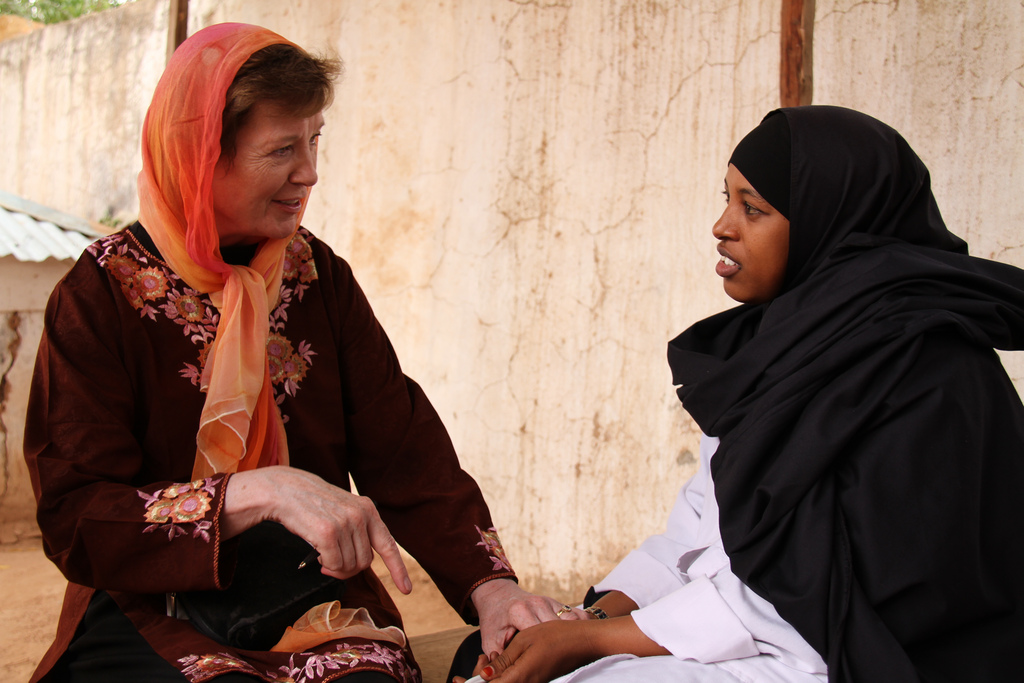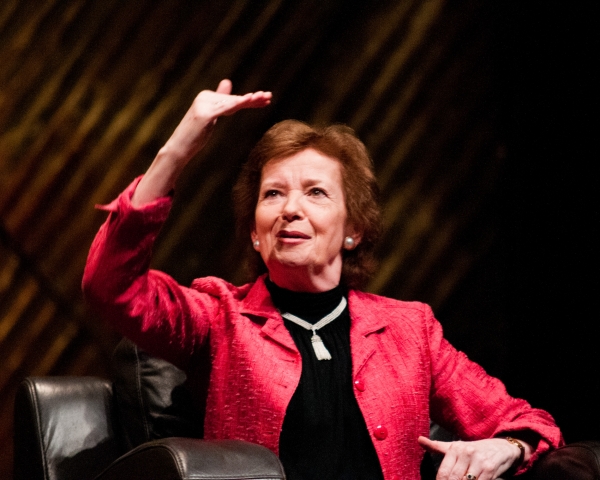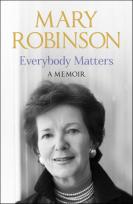
In June 1996 I attended a poetry reading by Seamus Heaney at the University of Stirling. The Principal of the University gave a short introduction, saying that we would remember the next hour for the rest of our lives. I believe he was right. There were many reasons that Seamus Heaney connected with and elevated us that evening. One was that Heaney was speaking to a community deeply shocked by the tragedy of the school shooting just 3 months earlier in neighbouring Dunblane, where I also lived. We were still shocked, still grieving, emotionally wide open. I remember thinking at the time that, somehow, Seamus Heaney met us in that space. Without addressing that pain directly, his poetry, his tone, his truth were like lifelines to us. He began and ended with his poem “Song” (from Field Work, 1979):
A rowan like a lipsticked girl.
Between the by-road and the main road
Alder trees at a wet and dripping distance
Stand off among the rushes.There are the mud-flowers of dialect
And the immortelles of perfect pitch
And that moment when the bird sings very close
To the music of what happens.

I had similar feelings seeing Mary Robinson last week at the Galway Arts Festival. The event was billed as Mary Robinson in conversation with Fintan O’Toole so the atmosphere was one of an evening among friends. The sound that greeted the pair when they emerged on stage at the Town Hall Theatre told a story in itself. A huge roar arose — applause, whoops and cheers. It was a wave of gratitude, affection and admiration for a woman who many of us regard as a hero, but also an expression I think of our hunger. We yearn for leaders with ethical vision, leadership skills, and courage in the face of injustice. We have so few of these (with our President Michael D. Higgins a notable exception). Seeing Mary Robinson reminded us of the best of us, what we have and also what we lack.
During her remarkable career as a constitutional lawyer, human rights campaigner, Senator, Ireland’s first female President, and the United Nations High Commissioner for Human Rights, Mary Robinson developed a reputation for fearless leadership. As she said last week, she never had a problem confronting bullies. She did that “growing up with four brothers” in Mayo and throughout her student days at Trinity College, as well as in Irish public life and on the world stage. As UN High Commissioner for Human Rights she voiced forthright criticism of human rights abuses following the events of 9/11 and the invasion of Iraq — and received harsh criticism. She told us that one of her colleagues remarked at the time that she might lose her job for speaking out, to which she replied: “It’s better to do this job then to try to keep this job.” Mary Robinson stepped down from her position at the U.N. in 2002.
For the past decade, Mary Robinson has devoted her passion, her intellect and her considerable energies to educating about and addressing our most serious global problems – racism, human rights abuses, child marriage and climate change. She is a founding member of The Elders (“one of the younger ones”, she wryly remarked) and founder of the Mary Robinson Foundation — Climate Justice. Her greatly anticipated memoir Everybody Matters will be published in September 2012.
During the wide-ranging conversation with Mary Robinson in Galway, Fintan O’Toole asked her about emigration, racism, her Presidency and her more recent global work. Emigration from Ireland, across generations, has deeply affected our national psyche, she said. In ways, “emigration is our psyche”. It “hardens us” but also contributes to traits such as our humour, resilience and adaptability. Of xenophobia and racism, however, Mary Robinson was unequivocal. Racism is the human rights issue of our time, she said. During her time as President, and since, she has been aware of racism in Ireland. Mary Robinson linked emigration and racism, saying that we must reflect on the generations of Irish who emigrated to Britain, the United States and elsewhere (my own grandparents among them). How did they or would they have felt experiencing the racist treatment which some emigrants to Ireland experience?
Mary Robinson spoke most passionately about climate justice. She recounted how she has been struck over and over again, across her travels to poorer communities in Africa, Asia and South America, by the cataclysmic effects of climate change. Robinson described how her friend Constance, a small farmer in Uganda, told her that there are no longer any seasons, only cycles of drought and flash flooding. These are dramatic and recent changes which Constance emphatically described as “outside our experience”. Robinson realised that this is likely to mean 200 years of experience, as oral tradition stretches back through the generations. Mary Robinson is clear about our responsibilities in the developed world to work towards climate justice. We must reduce our reliance on oil, continue to invest in and develop renewable forms of energy, and help the developing world become climate resilient. The developing world is suffering “because of what we have done”.
Mary Robinson describes climate change and the goals of climate justice
Of all there is to admire about Mary Robinson, her warmth and humanity shine above all else. She spoke openly last week about all she has learned throughout her public life. She spoke of her dread of public speaking when she was younger, and how she decided she had to overcome that fear in order to speak what had to be said. She learned also, during her time as President, about the importance of tone and humour. Her landmark speech to the Houses of Oireachtas in Ireland in 1995 was feted globally, particularly for her potent concept of the Irish diaspora and the light in the window at Áras an Uachtaráin. The speech was not warmly welcomed by the assembly in the House, however, and she realised that her tone was too serious: “I was too important about it”. So she learned to communicate more of herself and her humour. And from the playwright Tom Murphy she said she gained a deeper understanding of tone while “telling it true”. Today, Mary Robinson is a woman who brings all of her considerable talents to her work, along with her wonderful humanity, humility, honesty and humour. For all of this, and all she has done, she is loved and cherished.
At the end of Mary Robinson’s talk with Fintan O’Toole, she offered to take questions from the audience. My thoughts were on young people including my own children, so I asked what words of advice or inspiration she might have for young people as they face economic and social challenges, both national and global, unforeseen just a few years ago. In her thoughtful response Mary Robinson spoke first about the power of connection which many young people have – mentioning Twitter and Facebook as examples – which enable them to connect with others across the country or across the globe. This can be a great force for building shared understandings. She went on to describe and to quote from Seamus Heaney’s mighty poem From the Republic of Conscience, commissioned by Amnesty International and published on Human Rights Day, 1985, and in the Irish Times in 2008. The poem, simple in style and language, but rich in metaphor, describes the narrator’s journey to the Republic of Conscience. The poem concludes:
The old man rose and gazed into my face
and said that was official recognition
that I was now a dual citizen.He therefore desired me when I got home
to consider myself a representative
and to speak on their behalf in my own tongue.Their embassies, he said, were everywhere
but operated independently
and no ambassador would ever be relieved.
This poem, Seamus Heaney’s gift, is Mary Robinson’s message to young people. We are all connected and each of us has dual citizenship: in our own nation(s) and in the Republic of Conscience. Owning and understanding our shared values is the key to individual fulfillment, as well as the hope for our collective global future. I carried this message home like a beautifully wrapped present, a precious gift to my own children.
Of course, it is a gift to us all. Mary Robinson’s words are still ringing inside me. Her words, her work, her example will continue to affect my work in the future. Today I am thinking about ways to connect my IT students with Mary Robinson’s ideas and the work of her foundation on Climate Justice. And I would be delighted to communicate with anyone thinking along these or similar lines.
Finally, thanks to my dear friend Mary Loftus who joined me in Galway for this wonderful event and thanks to Sally McHugh for making contact afterward. Thanks also to Fintan O’Toole and the Galway Arts Festival, and the warm and wonderful people of Galway, for hosting and welcoming Mary Robinson in fine style.
But most of all, thank you, Mary Robinson.
“You see me because I stand on the shoulders of so many.” – Mary Robinson, quoting Desmond Tutu
Image source: CC BY 2.0 Trocaire, Jennifer O’Gorman, July 2011, Dollow, Somalia

A lovely article Catherine to start off our weekend. Many thanks.. Shane C
Thanks very much, Shane. Mary Robinson quite an inspiration 🙂
I was speechless after Mary Robinson- and now I’m speechless again, Catherine. This is beautiful. You are a brave, brave woman and wonderful writer of truth and beauty. Thankyou for sharing this with us.
Mary x
Mary, thanks so much. It’s almost impossible to capture such an experience, but I had the urge to share it as best I could. What a moment — so happy to have shared it with you 🙂
Hi Catherine. Sorry to have missed this conversation and thanks for the wonderful report Perhaps one way to share Mary Robinson’s ideas and the work of her foundation on Climate Justice is to get kids to learn form their own place …..You might be interested in this kinvara symposium taking place at end of month……http://www.burrenbeo.com/learning-landscape/apathy-empathy …….it’s all connected….
On another issue I am trying to organise something else for Kinvara for September and hoped to talk to you about it over the next few days. I.will try and track down your phone number if that’s ok….
Ann O’Connor
Hi Ann — thanks for your comment and the link. Connecting global issues to the specific, to place, is a great idea. I’ll be happy to share the link to the symposium on Twitter. My email address is catherine.cronin [at] nuigalway.ie — I would be happy to speak with you about the symposium and the other events in September. Talk soon…
‘Thank you Catherine Cronin’ for this wonderful article on Mary Robinson.
Thanks for your lovely comment, Olive — so glad you enjoyed it. I started to read Mary’s memoir this weekend… would love to stop the world for a day and keep reading! 🙂
Many thanks! It a superb website.